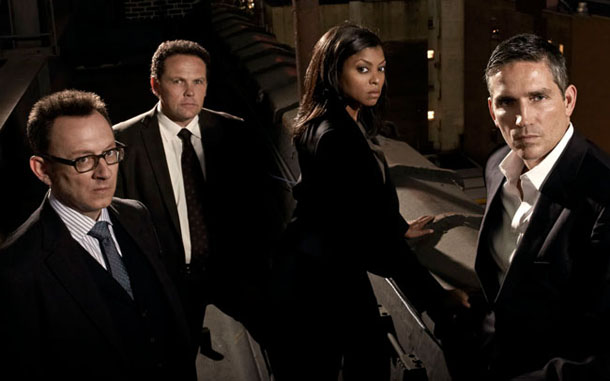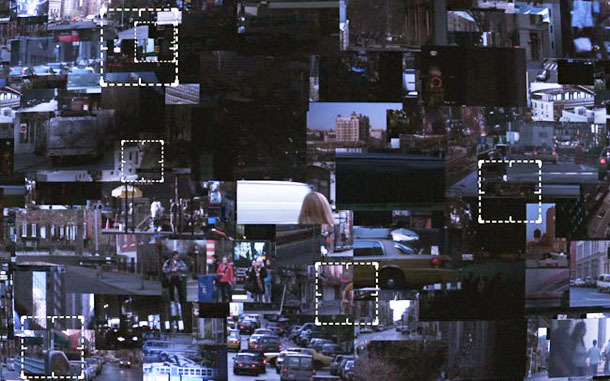
In the first half of Person Of Interest 's first season it's not evidently a show that has any genre credentials. In the land of UK TV listings it's been quite sitting comfortably next to non-fantastical police procedural shows CSI and The Mentalist . Actually ignore CSI , it's positively bats-arse fantasy, but I'm sure you know what I'm getting at. Person Of Interest has a solid stand-alone episode format which makes telly execs happy, but on closer inspection as the series progresses and the story arcs are revealed, you can begin to see the DNA of a show which has its roots in sci-fi.
I was keeping an eye on this show around the time that SFX mag popped the question: “Is Person Of Interest sci-fi?” I'm following at UK pace and DVD, so having digested season one I'm waiting on season two which has already aired in some countries.
What I like about Person Of Interest is the central premise. A machine that sees everything and everyone and uses the masses of data to predict future crimes. Spitting out a social security numbers of individuals who may be either a victim or perpetrator, leaving the central duo – one brains, one brawn – to track them down while submitting footage of the fatal incident to You've been Framed. I made that last bit up.
A machine that sees everything isn't a new idea, but it is given a modern twist, and now made more prescient with the recent real life incident of American goventment analyst Edward Snowden shouting about prisms and allegedly revealing just how much personal data governments are naughtily downloading off facebook. Orwell would be proud.
Are You Ashamed Big Brother?
It doesn't lean too hard on its premise, though. Instead Person Of Interest wraps itself up in a thick covering of more traditional tropes: cops, bent cops, gangsters, saving kids and helping single mums. The nature of the machine is a very slow reveal as season one progresses, with flashbacks suggesting that it's more than just numbers. It only overtly shows its hand in the final moment of the first series, which builds to a really great cliffhanger finale.
Is Person Of Interest afraid to wear its credentials on its sleeve? Playing devil’s advocate I was reminded of Tamsin Outhwaite sinking her own BBC show Paradox by saying it wasn't sci-fi when it blatantly was just that.
I don't think that's the case here. As a series geared more towards stand-alone episodes, it's easy to watch and enjoy and you can take what you want from it. Tune in for casual knee-popping action, stay for the mystery machine.
Get sneak previews, exclusive competitions and details of special events each month!
It's fitting that Person Of Interest is attending San Diego comic-con; the two central heroes have more in common with comics than TV. They are Jim Caviezel's John Reece, a rehabilitated lone ex-service soldier and Harold Finch the billionaire programmer who built the machine, played by the rather good Micheal Emerson. Both actors with solid sci-fi credentials, and their characters motivations are refreshingly clean and simple – to stop bad things from happening. Finch sits in his high tech library (Batcave) talking into the air on invisible wifi headset, while gravelly voiced Reece pounds the streets in a long black coat (cape) observing people from the tops of buildings and knee-capping bad guys.
Produced by Bryan Burk & Jonathan Nolan, brother of Christopher, its a show that takes the grounded elements from the recent Batman movies and re-packages them quite cunningly not just for TV, but for mainstream week night TV.

Fancy Graphics
Then there's the graphics. Fringe had big floating text; other shows might pop up an on-screen caption to tell you where or when you are; but Person Of Interest gets clever. The opening credits are full of little target boxes and recording meters. Security cameras tracking movement and faces, then as episodes move from one location to another we get a little zoom-in-zoom-out transition or a feed from a security camera. As a show production value, it's all very slick.
As the series settles into its groove it all gets a lots more contextual with bar graphs, voice scanning indicators and wire-frame models of the city. I'll admit it took me a while to catch on. These aren't just slick production graphics; we're seeing what the machine sees. The computations and calculations running through its abstract compound eyes. “You are being watched”. It's not explained or referred to. Like kids being fed sprouts hidden in a mince pie, I'd love to think there are folk out there who “don't do sci-fi”, that are happily watching this because it looks really cool.
It's evident the producers are consciously trying to go against convention. We've never seen the machine so far, apart from a flashback. I'll be interested catch up on the second season, and with the confirmation of a third if their presence at Comic Con is a statement of intent for the direction of the show. Person Of Interest , “You are being watched.”
John Cooper


